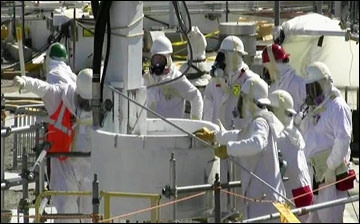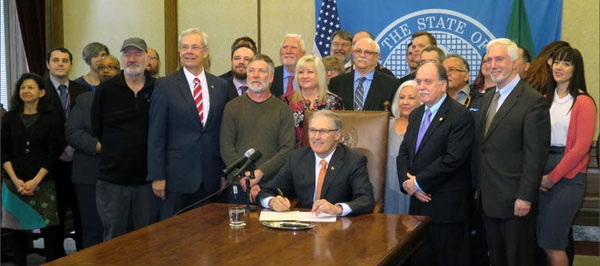STATE GOVERNMENT
Feds oppose workers’ comp protections for Hanford workers
Trump’s Justice Department threatens to sue state over new workers’ comp law
By DAVID GROVES
The Stand
 OLYMPIA (Nov. 27, 2018) — Earlier this year, state lawmakers approved labor-supported legislation to address the nearly insurmountable barriers that workers at the Hanford Nuclear Reservation face when they get sick due to toxic exposure and seek relief via the workers’ compensation system. Now the Trump administration is threatening to take that hard-earned victory away.
OLYMPIA (Nov. 27, 2018) — Earlier this year, state lawmakers approved labor-supported legislation to address the nearly insurmountable barriers that workers at the Hanford Nuclear Reservation face when they get sick due to toxic exposure and seek relief via the workers’ compensation system. Now the Trump administration is threatening to take that hard-earned victory away.
The U.S. Department of Justice has threatened to sue the State of Washington to take away the new protection for sick Hanford workers, claiming that it “discriminates against the federal government and those with whom it deals.” In a letter to Gov. Inslee received earlier this month, James J. Gilligan, Acting Director of the U.S. Department of Justice’s Civil Division Federal Programs Branch, vows to file a civil lawsuit against the state on or about Friday, Nov. 30 unless the state “resolves this matter” to their satisfaction.
“We are working with the Office of the Attorney General to assess the federal complaint,” said Tim Church, a spokesman for the Washington State Department of Labor and Industries. “We’ve contacted the Department of Justice and have let them know that we are willing to meet to hear them out on this issue.”
 Despite the recognized risks at the nation’s most dangerous worksite, Hanford workers’ comp claims have historically been denied at five times the rate of other self-insured employers. That’s because the U.S. Department of Energy and its contractors at Hanford have used the lack of accurate worksite data on exposure to some of the most hazardous substances known to man in order to question and deny the validity of sick workers’ claims.
Despite the recognized risks at the nation’s most dangerous worksite, Hanford workers’ comp claims have historically been denied at five times the rate of other self-insured employers. That’s because the U.S. Department of Energy and its contractors at Hanford have used the lack of accurate worksite data on exposure to some of the most hazardous substances known to man in order to question and deny the validity of sick workers’ claims.
“Hanford workers have to prove the cause of their illness without knowing exactly what chemicals and radiological hazards they had been exposed to,” said Joe Kendo, Government Affairs Director of the Washington State Labor Council, AFL-CIO. “The Department of Energy can’t – or won’t – disclose the precise nature of those hazards, so sick and injured workers are forced to make the case with one hand tied behind their backs, and blindfolded. Worse yet, these for-profit private contractors self-insure their workers’ compensation programs and aggressively fight workers’ claims, hoping they’ll just go away. This makes it even harder for workers to get the treatment and wage replacement they need to heal and return to work.”
SHB 1723, prime sponsored by Rep. Larry Haler (R-Richland) and approved this year on strong bipartisan votes, enacted a previous recommendation that certain illnesses among Hanford workers are presumed to be work-related when they seek workers’ compensation coverage. This presumption is similar to the one that already exists for firefighters, who are similarly exposed to toxic chemicals and vapors in their line of work.

Gov. Jay Inslee signed SHB 1723 into law on March 7, 2018. It took effect June 7.
“We heard from and met with workers who developed conditions ranging from respiratory to neurological diseases from exposure to chemicals while working at Hanford,” said Rep. Mike Sells (D-Everett), one of the bill’s sponsors and chair of the House Labor and Workforce Standards Committee. “Some cases were truly tragic and heartbreaking. Justice for these workers and their families is well overdue. This legislation was necessary.”
But the Trump administration’s Justice Department now claims that the new law, which took effect in June, is “impermissibly discriminatory because it treats other entities in the State better than it treats federal contractors and the Federal Government.”
Advocates for Hanford workers expressed confidence that the new law would survive any legal challenge.
“The cleanup from nuclear weapons production has left a trail of sick and forgotten workers in its path for decades,” said Nickolas Bumpaous, Government Affairs Director for Plumbers and Steamfitters (UA) Local 598. “Washington working families are performing some of the most dangerous work, not just in our state but in the nation. Substitute House Bill 1723 has succeeded in correcting the injustices of the workers’ compensation system, and has provided protection and support to those who need it the most. I have great confidence in the Legislature and in state lawmakers’ willingness to reform programs so that they may reflect the moral backbone of all Washingtonians. The federal government should spend more time allocating resources to the protection and safety of working families, and less time trying to eradicate a much-needed state law.”





